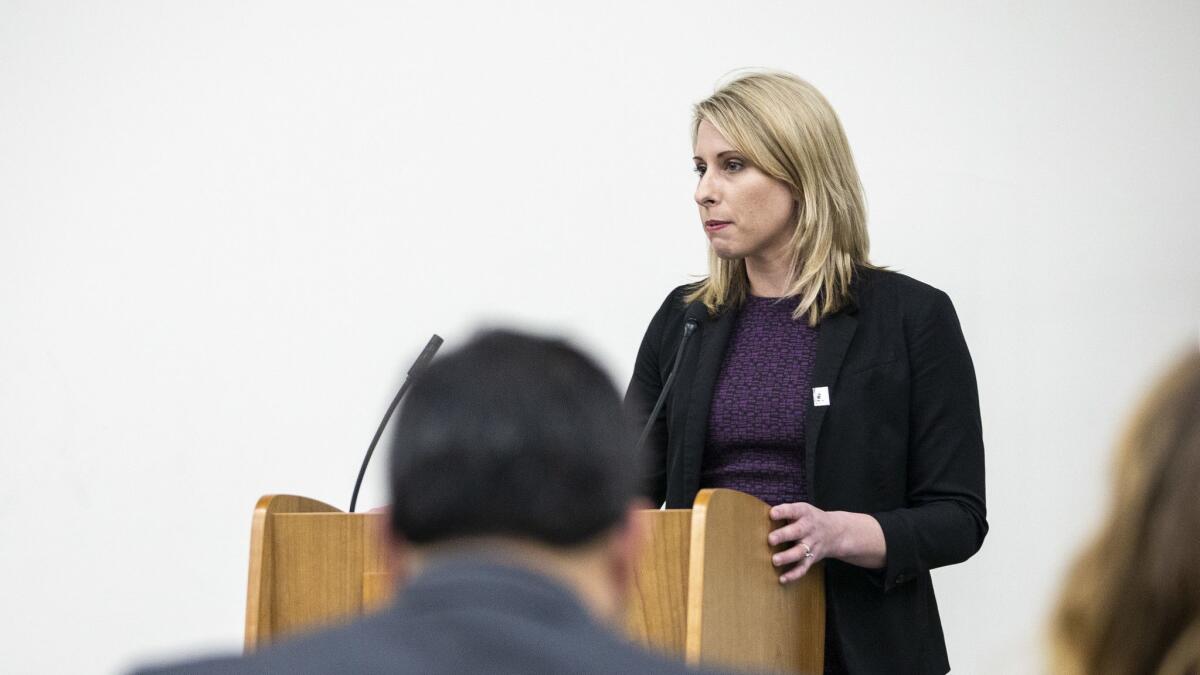Big money pours in for Democrats in key California races

In what has already been a banner year for Democratic fundraising, candidates hoping to flip GOP-held House seats in California just hit another benchmark: Five of them running in competitive races raised more than $1 million in just three months.
That’s a stunning feat when you consider only two House challengers had raised $1 million total by this point in 2016. No candidate for Congress in California, incumbents included, brought in $1 million during the same three-month period two years ago.
For the record:
3:20 p.m. July 16, 2018An earlier version of this story referred to Walters’ home as in Laguna Niguel. It is in Laguna Beach.
Two other Democrats also pulled in more than $1 million between April 1 and June 30, but most of it came from their own pockets in the form of loans.
California is an expensive state and with so many targeted incumbents, 2018 was always going to be an expensive year. But these numbers are eye-popping even for longtime observers of politics here.
“That the candidates are even capable of pulling in that much money in a short amount of time speaks to the real energy for this midterm election and that’s pretty unusual,” said Casey Dominguez, a political science professor at the University of San Diego. Dominguez is an expert on congressional elections and campaign finance.
The sheer volume of money going to so many Democratic candidates, she said, also speaks to donors’ uncertainty over which races might actually be winnable in the fall.
Democrats must capture 23 seats nationwide to regain control of the House but have their eye on more than 100 across the country. Ten are in California.
In all but one of those California races, Democrats out-raised their Republican opponents in the second quarter, in some cases by two- or three-fold. The exception was Rep. Devin Nunes (R-Tulare), who has continued to rake in millions in campaign cash. Nunes, who is expected to be reelected, raised more than $4.8 million to the $1.4 million his Democratic challenger, Andrew Janz, brought in.
The other four Democrats who raised more than $1 million without personal loans were Josh Harder, taking on Central Valley Republican Jeff Denham; Katie Hill, who is challenging Rep. Steve Knight (R-Palmdale); Katie Porter, opposing Rep. Mimi Walters (R-Laguna Beach); and Mike Levin, running against Republican Diane Harkey in the race to replace retiring Rep. Darrell Issa (R-Vista).
A significant portion of their funds came from the left-leaning upstart Swing Left, a group formed in early 2017 to channel energy from Democratic activists toward flipping swing districts across the country. As California’s crowded primaries raged on, the group socked away money to give to the eventual victor in each race.
“We’d rather the money we’re raising be spent attacking Republicans than attacking fellow Democrats,” said Graham Newhall, a spokesman for Swing Left.
In total, Swing Left says it has distributed more than $1.1 million to California candidates since the primary.
“It’s not just the money. You now have a bunch of volunteers to plug into your campaign, to start phone banking or doing canvassing,” Newhall said.
Zack Czajkowski, Hill’s campaign manager, says the money has helped pay for the glossy flyers volunteers hand out when they knock on doors. It will also allow the campaign to expand staff earlier than expected to manage an influx of volunteers, many of them recruited with the help of Swing Left.
GOP consultant Rob Stutzman says the fundraising numbers, which are “far above historical trends,” validate that Republicans are facing real threats to keeping these seats. “Money is not everything, but it provides them with advantages that Democrat candidates in these seats have never had before,” Stutzman said.
Because of all the advantages incumbents have, out-raising them is all but a requirement for Democrats hoping to unseat them. The GOP members under threat have responded by stockpiling more cash than their opponents.
Despite Katie Porter’s impressive $1 million in contributions, for example, she had $780,831 in the bank as of June 30, a little over half the money Walters has accumulated. Knight, who raised about a third of Hill’s total in the second quarter, has nearly $500,000 more in the bank than she does.
Several GOP incumbents who have struggled to raise money in the past ended the quarter without much of a cash advantage. Rep. Dana Rohrabacher of Costa Mesa, for example, had $479,366 in the bank compared to $482,623 for his wealthy Democratic opponent, Harley Rouda. The others with close cash margins — Rep. Tom McClintock of Elk Grove and his opponent Jessica Morse as well as Rep. Duncan Hunter of Alpine and challenger Ammar Campa-Najjar — are running in seats considered reliably Republican.
Conservative outside groups that have promised to bolster Republicans’ efforts to keep the House reported blockbuster numbers as well.
Congressional Leadership Fund, which has already pledged to spend more than $6 million on TV ads in three California districts and has been canvassing districts for months, reported taking in $51 million during the second quarter, leaving them with at least $71 million in the bank four months out from the general election.
House majority leader Kevin McCarthy of Bakersfield, who has already helped raise nearly $20 million for more than 100 candidates this year, reported taking in more than $1.2 million in his own campaign account. He was also key to raising $8.7 million through a joint fundraising committee with Vice President Mike Pence that benefits several California Republicans.
Coverage of California politics »
California’s GOP House members are taking their challengers more seriously and the numbers show it »
For more on California politics, follow @cmaiduc.
More to Read
Get the L.A. Times Politics newsletter
Deeply reported insights into legislation, politics and policy from Sacramento, Washington and beyond. In your inbox three times per week.
You may occasionally receive promotional content from the Los Angeles Times.











